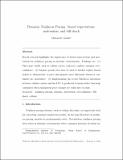| dc.contributor.author | Grubb, Michael D. | |
| dc.date.accessioned | 2015-10-07T14:42:30Z | |
| dc.date.available | 2015-10-07T14:42:30Z | |
| dc.date.issued | 2012-01 | |
| dc.identifier.issn | 01677187 | |
| dc.identifier.uri | http://hdl.handle.net/1721.1/99174 | |
| dc.description.abstract | Recent research highlights the importance of biased expectations and inattention for nonlinear pricing in dynamic environments. Findings are: (1) Three-part tariffs, such as cellular service contracts, exploit consumer overconfidence. (2) Surprise penalty fees may be used to further exploit biased beliefs or alternatively to price discriminate more efficiently whenever consumers are inattentive. (3) Implementing the recent bill-shock agreement between cellular carriers and the FCC is predicted to harm rather than help consumers when endogenous price changes are taken into account. | en_US |
| dc.language.iso | en_US | |
| dc.publisher | Elsevier | en_US |
| dc.relation.isversionof | http://dx.doi.org/10.1016/j.ijindorg.2011.12.007 | en_US |
| dc.rights | Creative Commons Attribution-Noncommercial-NoDerivatives | en_US |
| dc.rights.uri | http://creativecommons.org/licenses/by-nc-nd/4.0/ | en_US |
| dc.source | MIT Web Domain | en_US |
| dc.title | Dynamic nonlinear pricing: Biased expectations, inattention, and bill shock | en_US |
| dc.type | Article | en_US |
| dc.identifier.citation | Grubb, Michael D. “Dynamic Nonlinear Pricing: Biased Expectations, Inattention, and Bill Shock.” International Journal of Industrial Organization 30, no. 3 (May 2012): 287–290. | en_US |
| dc.contributor.department | Sloan School of Management | en_US |
| dc.contributor.mitauthor | Grubb, Michael D. | en_US |
| dc.relation.journal | International Journal of Industrial Organization | en_US |
| dc.eprint.version | Author's final manuscript | en_US |
| dc.type.uri | http://purl.org/eprint/type/JournalArticle | en_US |
| eprint.status | http://purl.org/eprint/status/PeerReviewed | en_US |
| dspace.orderedauthors | Grubb, Michael D. | en_US |
| mit.license | PUBLISHER_CC | en_US |
| mit.metadata.status | Complete | |
